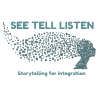SEE.TELL.LISTEN
Improving Refugee’s Digital Literacy through Photovoice and Storytelling
Portugal, Spain, Italy and Greece comprise four national experiments with responses to forced displacement. Undeniably, the two last countries have been impacted greatly by the flow of refugees coming in from both the Eastern and Central Mediterranean migration routes: in 2015 and 2016, the International Organization for Migration reports over 1,3 million arrivals in both countries. Portugal is one of the six most relevant participants in the EU Emergency Relocation Mechanism, having relocated over 1500 persons from Greece and Italy over a two-year period; Spain works as both a participant in the Emergency Relocation Mechanism and as a border country by way of its Ceuta and Melilla border zones. Each country provides this project with a different site for the observation of refugee lives in Europe; each offers us with opportunities for build capacity in refugee communities for these to take control over how they are narrated as human beings and how their lives are represented in European public spheres.
The project is first and foremost envisioned as an empowerment process. It is structured towards social inclusion along two axes:
- Acquisition of tools and skills which are key to self-sufficiency in the current knowledge economy, particularly digital literacy, and the ability to create and shape narratives on forced displacement, which are key to enable refugees' sense of mastery over their life courses;
- Development of innovative practice in education, specifically adult education, in an increasingly digital economy and information-centred society. Experience shows that traditional learning and teaching are not always adequate to the needs of refugees, particularly upon arrival. Innovation is thus a first-order need when training curricula are designed.
Objectives
The main objectives are:
- to give a voice to people who have experienced loss of control and mastery over their own lives.
- to promote reskilling and upskilling through non-formal education in the context of increasingly digital economies and societies.
Specifically the objectives are:
- to promote transnational knowledge sharing and capacity building of hosting societies towards refugee empowerment and integration at a socio-labour level within digital literacy & storytelling courses.
- to foster cultural expression of refugees and increase their self-confidence, demonstrating their creativeness and encouraging communication with people from different backgrounds, presenting their own stories as part of a reciprocal relationship with citizens of the receiving society through the DL&ST courses, as well as connecting to the hosting community’s history.
- to respond to refugee’s challenges, namely on the socio-labour context, by working together with civil society organizations, defining and strengthening refugee integration and empowerment support programs.
- to raise awareness to the challenges refugees face, being in their countries of origin, on the travelling process or in the hosting society, by the process of telling their stories through innovative and creative techniques based on digital literacy and storytelling methods.
Project Scope
The project will cover the following activities:
- Implementation of 7 Local networks of stakeholders
- Carry out of 2 study visits for knowledge capitalisation
- Elaboration of 1 Best Practices catalogue
- Elaboration of 1 Training module on digital literacy
- Elaboration of 1 Training module on digital storytelling
- Elaboration of 1 Training module on Photovoice methods
- Elaboration of 1 Training Curriculum on Digital Literacy, Storytelling and Photovoice for refugees’ empowerment
- Implementation of 10 Digital Literacy and Storytelling Courses
- Creation of 120 ‘Stories by Refugees’ projects
- Creation of 30 digital stories
- Elaboration of 1 guideline analysis from DL&ST courses
- Elaboration of 1 White Paper
|
The website of the project: |
The Facebook page: |

vrijdag 18 januari 2019




